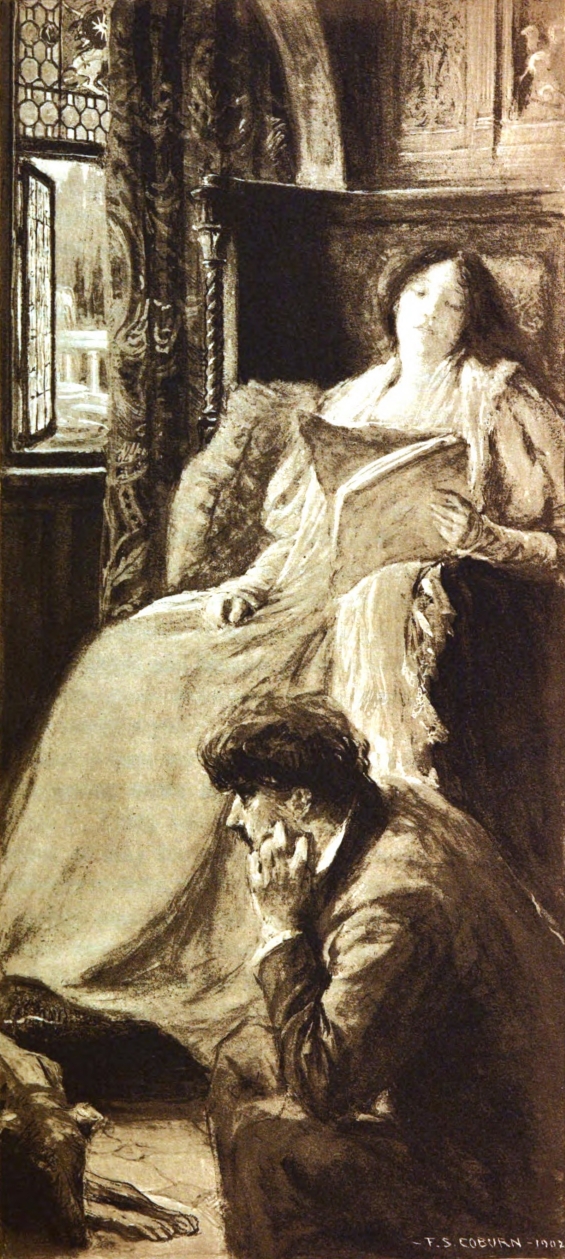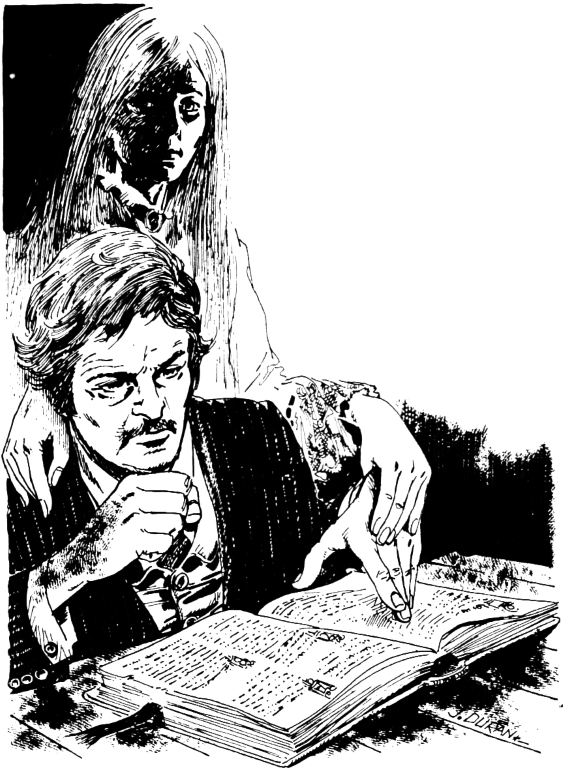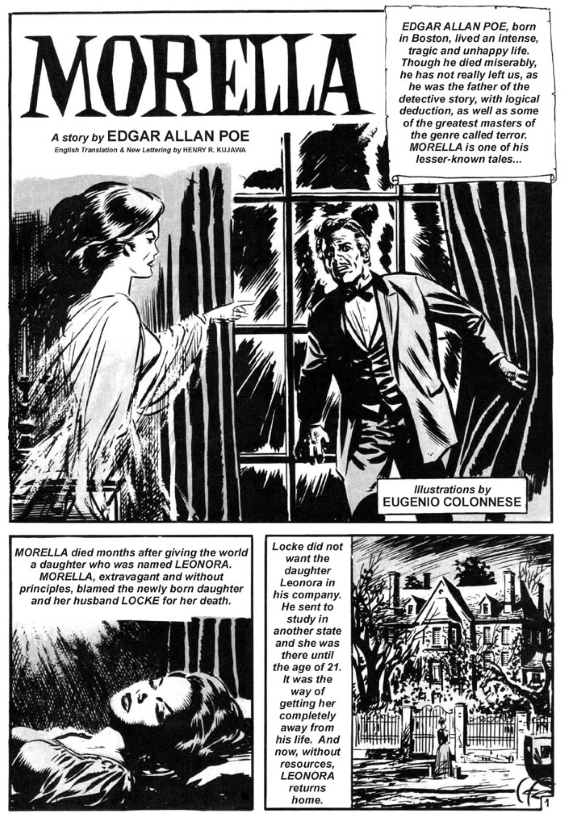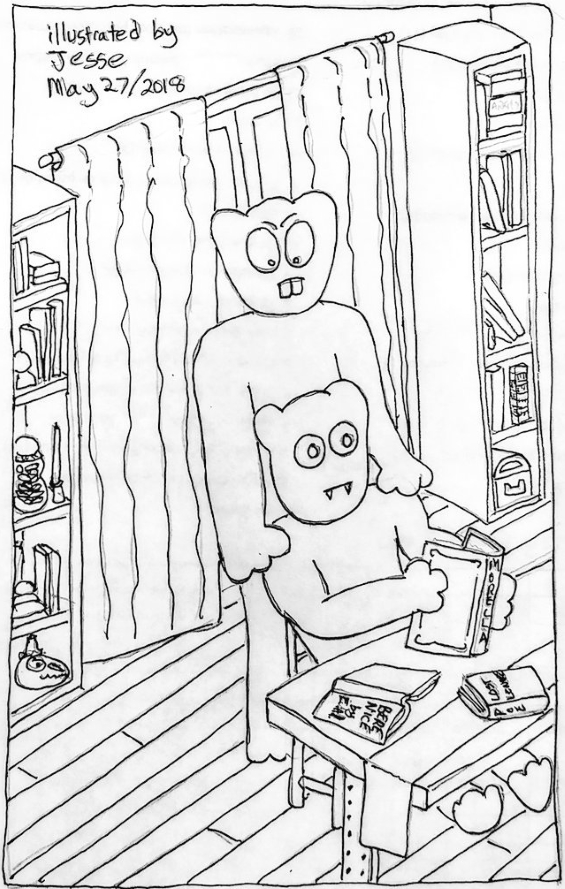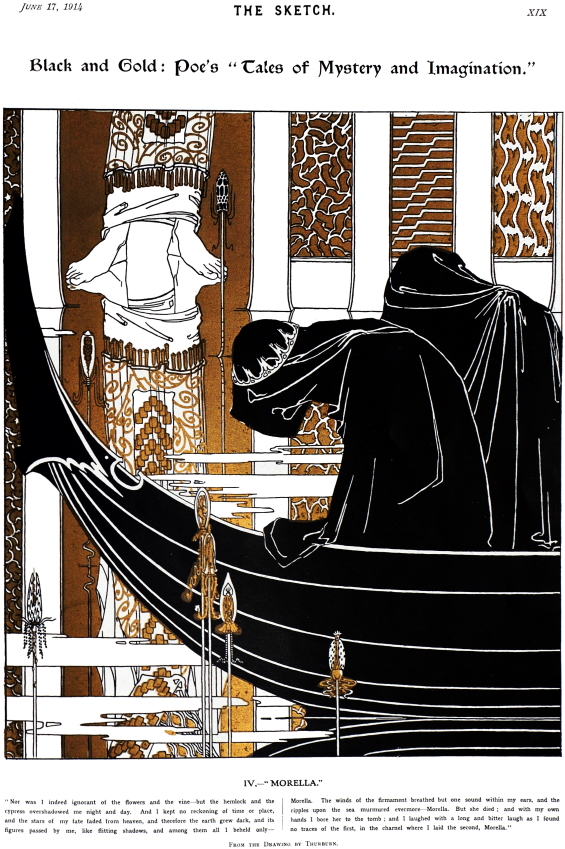
 The SFFaudio Podcast #507 – Seaton’s Aunt by Walter de la Mare; read by Mr Jim Moon. This is an unabridged reading of the short story (1 hour 36 minutes) followed by a discussion of it. Participants in the discussion include Jesse, Mr Jim Moon, Maissa Bessada, and Wayne June
The SFFaudio Podcast #507 – Seaton’s Aunt by Walter de la Mare; read by Mr Jim Moon. This is an unabridged reading of the short story (1 hour 36 minutes) followed by a discussion of it. Participants in the discussion include Jesse, Mr Jim Moon, Maissa Bessada, and Wayne June
Talked about on today’s show:
aunt?, ownt?, The London Mercury, April 1922, H.P. Lovecraft, pretty damn interesting, is it a ghost story?, Robert Aickman, Fontana Book Of Ghost Stories (Volume 1), M.R. James,, E.F. Benson, Thomas Liggoti, is it a vampire story?, a very successful ghost story, is it a witchcraft story?, necromancy, psychic vampirism, all about mood and sustaining a mood, atmospheric, very, creepiness sneaks in, chills up and down the spine,
“Deserving of distinguished notice as a forceful craftsman to whom an unseen mystic world is ever a close and vital reality is the poet Walter de la Mare, whose haunting verse and exquisite prose alike bear consistent traces of a strange vision reaching deeply into veiled spheres of beauty and terrible and forbidden dimensions of being.”
in a letter to Clark Ashton Smith, rumors about an ancient castle under which is a conclave of demons, not truckle with psychological fudging, real life stories, never tipped over the abyss, a feeling of being haunted, the weight of disbelief, monster,
“Of the shorter tales, of which several volumes exist, many are unforgettable for their command of fear’s and sorcery’s darkest ramifications; notably Seaton’s Aunt, in which there lowers a noxious background of malignant vampirism”
Shades Of Darkness adaptation, 9/10ths close to the book, a big switcheroo, switching the roles, dialogue from the story, adaptations are people interpreting, interpretive decisions, the girl Alice, more life to her at the beginning, the casting, what a role, a role of a lifetime, no eating, a mountain of a woman vs. doll-like, that thin and hungry look, her hair, a wig, dark hair, all this history, how intense people are, things going on, the number of parallel things that are happening, the first meeting the second meeting, the school, the strand, creepier, it feels like an actual memoir, weary of for no good reason, Withers, why is he telling this story, a chapter in a memoir, not very good person, Seaton’s not perfect, maybe this aunt is very moral, she does pretty much everything wrong, a huge colossal biotch, from a shit’s point of view, “a creature”, why does she act that way, she’s a prick or in league with the devil, she is a monster (in a any sense of the word), a horrible person, spite, little mind games, this is not Seaton’s story, may ownt, an extraordinary figure, a non-supernatural story, what made a person like this?, maybe she just way to much Lovecraft when she was young, we English, pongo, ape, monkey, bribed every time, some jam, lunch, expensive wine, the everyman, self-involved, does she kill him?, the roles were switched, bells and sparks, that chess scene,
Seaton’s aunt was wearing an extraordinary kind of lace jacket when we sidled sheepishly into the drawing-room together. She greeted me with a heavy and protracted smile, and bade me bring a chair close to the little table.
“I hope Arthur has made you feel at home,” she said, as she handed me my cup in her crooked hand. “He don’t talk much to me; but then I’m an old woman. You must come again, Wither, and draw him out of his shell. You old snail!” She wagged her head at Seaton, who sat munching cake and watching her intently.
his room is full of cages, down at the pond, a dysfunctional family,
“And we must correspond, perhaps.” She nearly shut her eyes at me. “You must write and tell me everything behind the creature’s back.” I confess I found her rather disquieting company. The evening drew on. Lamps were brought in by a man with a nondescript face and very quiet footsteps. Seaton was told to bring out the chess-men. And we played a game, she and I, with her big chin thrust over the board at every move as she gloated over the pieces and occasionally croaked “Check!”—after which she would sit back inscrutably staring at me. But the game was never finished. She simply hemmed me defencelessly in with a cloud of men that held me impotent, and yet one and all refused to administer to my poor flustered old king a merciful coup de grâce.
teaching chess, the aunt and Withers are parallel, Arthur chose him, something of his aunt there, toying and sparing,
“There,” she said as the clock struck ten—”a drawn game, Withers. We are very evenly matched. A very creditable defence, Withers. You know your room. There’s supper on a tray in the dining-room. Don’t let the creature over-eat himself. The gong will sound three-quarters of an hour before a punctual breakfast.” She held out her cheek to Seaton, and he kissed it with obvious perfunctoriness. With me she shook hands.
“An excellent game,” she said cordially, “but my memory is poor, and”—she swept the pieces helterskelter into the box—”the result will never be known.” She raised her great head far back. “Eh?”
It was a kind of challenge, and I could only murmur: “Oh, I was absolutely in a hole, you know!” when she burst out laughing and waved us both out of the room.
immoral behavior, a cloud of men, how she treats her nephew, Withers or Johnson or Wither or Smithers, another dig, tapping into something very British, mirrored, a dishonest narrator, passing judgement on all and sundry, a hideous old beast, she’s not such a bad old stick, a dull stolid chap, what’s expected, a public school attitude, everyone’s a jolly good sort, a mask for bad behavior, a cavalier with the truth, very calculated, foibles of behavior, you are nothing to me, it’s a test, dare you correct an old lady, is she’s too self aware?, if this were a true memoir, they sneak into her room and hide in her closet, too intellectual for her own good, why she’s a miss, about half way through the book,
We turned and walked slowly towards the house, across whose windows I confess my own eyes, too, went restlessly wandering in search of its rather disconcerting inmate. There was a pathetic look of draggledness, of want of means and care, rust and overgrowth and faded paint. Seaton’s aunt, a little to my relief, did not share our meal. Seaton carved the cold meat, and dispatched a heaped-up plate by an elderly servant for his aunt’s private consumption. We talked little and in half-suppressed tones, and sipped a bottle of Madeira which Seaton had rather heedfully fetched out of the great mahogany sideboard.
I played him a dull and effortless game of chess, yawning between the moves he himself made almost at haphazard, and with attention elsewhere engaged. About five o’clock came the sound of a distant ring, and Seaton jumped up, overturning the board, and so ending a game that else might have fatuously continued to this day.
no malice, interpretation, he’s turning into her, becoming more sympathetic to her, my aunt, we lost all our money, fairly obvious, the aunt has spent the inheritance, stopping at the chemists to get rat poison, WHY?, is Seaton trying to kill his aunt?, a half-term holiday, for his own use, another parallel, what’s with the bangle?, only when pirating, a craze for wearing a ring, a craze for wearing bangles, wearing a rubber band as a bangle, a little affectation, a bit of jewelry, more adult, a bit glamorous, to be interesting and opulent, bullying, perfectly horrid, a touch of the tar brush, not white enough, a bit debonair, a bit gypsy,
I can scarcely describe with what curious ruminations I led the way into the faded, heavy-aired dining-room, with this indefinable old creature leaning weightily on my arm—the large flat bracelet on the yellow-laced wrist.
they are isolated, a maiden aunt, a malevolent creature, sometimes people are weird, weird household cultures, lobster mayonnaise, game sausages, the salad is the monster, a gargantuan appetite, you can’t scare me with your ghost stories, I’ll take it, she’s sure to be quite decent to you, code for child sexual abuse, she’s just a woman, does she lie ever?, the eye in the room, is this an Innsmouth story?, a lot of fishy eyes in this story, Irving S. Cobb’s Fishhead, frog boy?, did he go to the pond, or the sea?, her younger brother, she might be being misread, people turning into dust, Seaton is turning into his aunt, something you like to eat, so interesting,
We walked up the village street, past the little dingy apothecary’s and the empty forge, and, as on my first visit, skirted the house together, and, instead of entering by the front door, made our way down the green path into the garden at the back. A pale haze of cloud muffled the sun; the garden lay in a grey shimmer—its old trees, its snap-dragoned faintly glittering walls. But now there was an air of slovenliness where before all had been neat and methodical. In a patch of shallowly-dug soil stood a worn-down spade leaning against a tree. There was an old broken wheelbarrow. The roses had run to leaf and briar; the fruit-trees were unpruned. The goddess of neglect brooded in secret.
the Goddess of neglect, what the hell does that mean?, the whole opposite view of this whole thing, he’s dying, is he digging his own grave?, his way to try to get away, a keen naturalist, he’s making the best of a bad situation, I like wildness, forklift trucks to do her goddamned hair, the keys to his trust fund, salving a scrap of conscience, a bit of a tightfist, the money is running out, nuts and fruit, he doesn’t want to get too fat, tadpoles, between becoming what he’s going to be, the aunt croaks, he will never,
on one memorable occasion went to the length of bestowing on me a whole pot of some outlandish mulberry-coloured jelly that had been duplicated in his term’s supplies. In the exuberance of my gratitude I promised to spend the next half-term holiday with him at his aunt’s house.
expensive madeira, she sounds like a Lovecraft,
She confided in us her views on a theme vaguely occupying at the moment, I suppose, all our minds. “We have barbarous institutions, and so must put up, I suppose, with a never-ending procession of fools—of fools ad infinitum. Marriage, Mr. Withers, was instituted in the privacy of a garden; sub Rosa, as it were. Civilization flaunts it in the glare of day. The dull marry the poor; the rich the effete; and so our New Jerusalem is peopled with naturals, plain and coloured, at either end. I detest folly; I detest still more (if I must be frank, dear Arthur), mere cleverness. Mankind has simply become a tailless host of indistinctive animals. We should never have taken to Evolution, Mr. Withers. ‘Natural Selection!’—little gods and fishes!—the deaf for the dumb. We should have used our brains—intellectual pride, the ecclesiastics call it. And by brains I mean—what do I mean, Alice?—I mean, my dear child”—and she laid two gross fingers on Alice’s narrow sleeve—”I mean courage. Consider it, Arthur. I read that the scientific world is once more beginning to be afraid of spiritual agencies. Spiritual agencies that tap, and actually float, bless their hearts! I think just one more of those mulberries—thank you.
sounding like Thomas Ligotti, everything sucks, the trap of pessimism, a certain truth to it, justification for all manner of barbarity and horror, survival of the fittest, neoliberal morality, atmosphere building, the deaf for the dumb, intellectual pride, what do I mean Alice?, I mean courage, spiritual agencies, an attack on spiritualism, worst wedding toast ever, worst host ever, my child brother died in it, sleep well, how big a deal, another theory, one more of those mulberries, bastard squirrels, almost all vegetation, pop goes the weasel, Babylonian mythology, silkworms, death and rebirth, they spin their own shroud, Seaton should run away, the horse, she never will or she never would, she knows everything we’re doing, is she telepathic?, does she know the boy is buying rat poison?, cages and boxes, a box with a worm in it, role reversal, a switch, something strange happens near the end, off to tea, she calls him Arthur, is that you Arthur?, the ghost of Arthur?, get out, she doesn’t know, she killed him but she doesn’t even know, a voracious appetite, getting psychically fatter, she’s lost her source of food, she’s dying, conversing with the dead, still floating around the house, nothing to feed off anymore, not wholly embodied, that all seeing eye, seeing into other people’s minds, is he first in his class?, maybe if you apply the rules of science it’s almost like she’s in a superposition, the pile of clothes on the floor, the shoes two meters apart pointing at each other, a bundle of clothes, she’s in her room and she’s not in her room, Schrödinger’s Aunt, she’s just a human being, this story does both, a horror story, she’s a vampiric-witch who can talk to ghosts, The Terrible Old Man by H.P. Lovecraft, Spanish gold, easy pickings, bottled souls, old shipmates, three new bottles, his yard, moss covered totemic gods from the South Seas, Smithers Withers Johnson, not wholly of this dimension, why she’s so weird, an alien trapped on Earth, she knows she’s a shit, he does the exact same stuff as she does, not of this earth, a tragedy, the whole takeaway, feeling a little guilt, a life tragedy, nothing but a trap, you’re either a feeder or you’re the food, not an Oscar Wilde, outside of society, so masterfully put together, another way of going, she’s mean because she gives him the small room, who made the room full of cages and boxes, playing goth music all night, all about interpretation, a reflection of me (being in a cage), interesting parallels, a black widow spider, Wayne doesn’t buy that she’s innocent, in league with the devil, what happened to her brother?, a theory for Mr Jim Moon, The Terror Of The Blue John Gap by Sir Arthur Conan Doyle, mother of pearl, a monster in the mine, a letter Seaton, Samuel Seaton, the painting on the wall, the one with the eye is S. Seaton, retelling it as a modern story, he has a VIC 20!, security cameras in every room, we have the same kinds of issues and problems today, most manifest in her awareness of what she’s doing, self-conscious, Alice is almost consciousless, did she move away?, who did she escape?, a weird race of two, the deep one crown in a chest of jewlery, The Shadow Over Innsmouth, trying to find a place to put my sympathy, they’re screwed individually and in combination, All Hallows by Walter de la Mare, a sour church, Blackwood and Machenesque, a BBC Radio abridgement, the story becomes insane without pauses,
you know your space, a powerfully interesting way of writing, layering in themes that are almost ineffable, just words, so much is the way its told, a liberated thoughtful lady, Beethoven’s Moonlight Sonata, occult skill, charged with mockery and bitterness, ruined, processing through a filter of hate, began to play the opening bars of Beethoven’s “Moonlight” Sonata. The piano was old and woolly. She played without music. The lamplight was rather dim. The moonbeams from the window lay across the keys. Her head was in shadow. And whether it was simply due to her personality or to some really occult skill in her playing I cannot say: I only know that she gravely and deliberately set herself to satirize the beautiful music. It brooded on the air, disillusioned, charged with mockery and bitterness. I stood at the window; far down the path I could see the white figure glimmering in that pool of colourless light. A few faint stars shone, and still that amazing woman behind me dragged out of the unwilling keys her wonderful grotesquerie of youth, and love, and beauty. It came to an end. I knew the player was watching me. “Please, please, go on!” I murmured, without turning. “Please go on playing, Miss Seaton.”
No answer was returned to my rather fluttering sarcasm, but I knew in some indefinite way that I was being acutely scrutinized, when suddenly there followed a procession of quiet, plaintive chords which broke at last softly into the hymn, A Few More Years Shall Roll.
what significance did the hymn have for her?
I confess it held me spellbound. There is a wistful, strained, plangent pathos in the tune; but beneath those masterly old hands it cried softly and bitterly the solitude and desperate estrangement of the world. Arthur and his lady-love vanished from my thoughts. No one could put into a rather hackneyed old hymn-tune such an appeal who had never known the meaning of the words. Their meaning, anyhow, isn’t commonplace.
I turned very cautiously and glanced at the musician. She was leaning forward a little over the keys, so that at the approach of my cautious glance she had but to turn her face into the thin flood of moonlight for every feature to become distinctly visible. And so, with the tune abruptly terminated, we steadfastly regarded one another, and she broke into a chuckle of laughter.
engaging with him like an adult, the clothes of a man, his coat is too big for him, so grateful for the invitation, I really appreciate it because I’m dying, the paranoid literal ghost haunted victim of an in-league-with-the-devil-aunt, nothing more than a coffin, my brother William died, there’s hundreds of eyes like that in the house, I shan’t stand it much longer, did Seaton commit suicide?, all my plans are falling into place, the old mulberry jelly trick, we are told he has lavish pocket money, that would be in character, so lonely, the bangle as an amulet against her, Alice Outram, some good stuff, a now lost medieval village in Derbyshire, early 1900s travel, piggy back rides and hiding in closets, candles, a fascinating story, Seaton is definitely a liar, you were supposed to best man, more on the ball, creeped by the aunt, you hypocrite, a mismatch between emotions and what people say, being clever and arch, snarky, is it about control or just being playful, so much free-rangeness, allowed bullying to flourish, snapchat bullying, the mistakes of perception that you have in childhood, a confession story, somewhere in there Withers is having an argument with Seaton, some guilt, mistreating the old bird, what she says, calculated cruelty, emotionally abusive, emotionally neglectful, no sexual or physical abuse, she never lies to him, she never gaslights him, that never happened, you’re wrong, she demeans him, she knows everything that I think and what I do, he’s a squashed human, squashed at school, victimness, uninterested in his emotional being, baby monkeys, the monkey Withers, a monkey in with a tadpole, very subversive, what is the question, what is this story?, not fantasy, not science fiction, definitely weird fiction, vampire is stronger than ghosts (in here), prehistoricism, eternal evil, Silurians (Doctor Who reference), Doggerland, it feels so Lovecrafty because of all the fish, he is doomed, The Rats In The Walls, The Moon Bog, The Grove Of Ashtaroth by John Buchan,
And again I paused irresolutely a few paces further on. It was not fancy, merely a foolish apprehension of what the raw-boned butcher might “think” that prevented my going back to see if I could find Seaton’s grave in the benighted churchyard. There was precious little use in pottering about in the muddy dark, merely to discover where he was buried. And yet I felt a little uneasy. My rather horrible thought was that, so far as I was concerned—one of his extremely few friends—he had never been much better than “buried” in my mind.
dark!, a dark philosophy,
I was not a man of the world, nor was I much flattered in my stiff and dullish way of looking at things by being called one; and I could answer her without the least hesitation.
“I don’t think, Miss Seaton, I’m much of a judge of character. She’s very charming.”
“A brunette?”
“I think I prefer dark women.”
“And why? Consider, Mr. Withers; dark hair, dark eyes, dark cloud, dark night, dark vision, dark death, dark grave, dark!”
she’s goth, yo,
Perhaps the climax would have rather thrilled Seaton, but I was too thick-skinned. “I don’t know much about all that,” I answered rather pompously. “Broad daylight’s difficult enough for most of us.”

Posted by Jesse Willis

 Reading, Short And Deep #205
Reading, Short And Deep #205
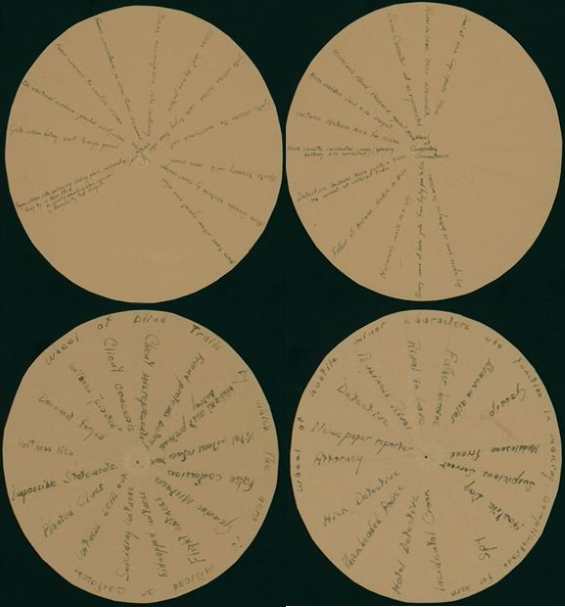
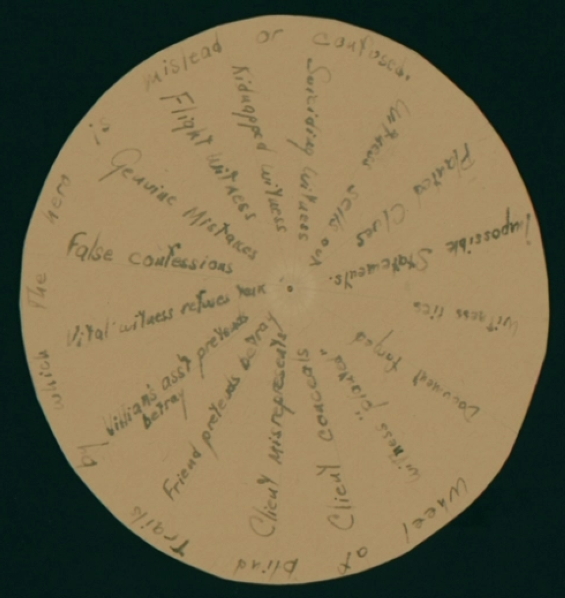
 The SFFaudio Podcast #513 – Jesse,
The SFFaudio Podcast #513 – Jesse, 
